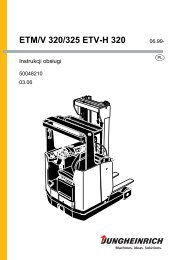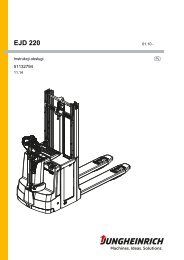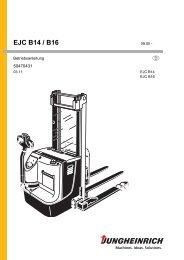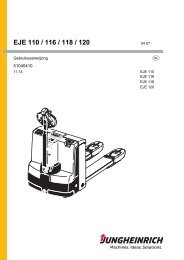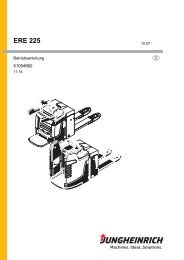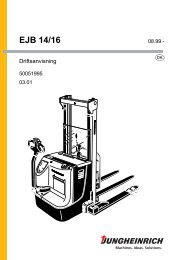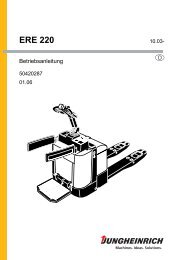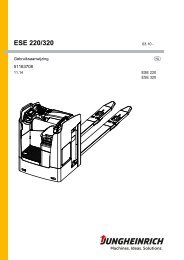ERE 220 - Jungheinrich
ERE 220 - Jungheinrich
ERE 220 - Jungheinrich
You also want an ePaper? Increase the reach of your titles
YUMPU automatically turns print PDFs into web optimized ePapers that Google loves.
y-pass system so that Israelis could reach West Bank and Gaza Stripdestinations without exposing themselves to terrorist attacks.In sum, until Arafat began his terror war, the growth of the Israelipopulation in the West Bank and Gaza, and the expansion of Israelivillages and towns in those territories, was highly beneficial economicallyfor the West Bank and Gaza Arab populations, did not entailsignificant loss of Arab privately owned land, offered legal recourseto the rare cases of unfair expropriation, and was accompanied by afar, far greater growth of Arab population and settlements in the WestBank and Gaza.The Role of the Settlements in the Peace ProcessThe role of the settlements in the context of the current conflict,and in the contentious issue of applying the “Road Map” to futurepeace negotiations, is perhaps the most complex and difficult issueto deal with. This is precisely because Arab propaganda has been soeffective in establishing as axiomatic that the settlements are:a.) Illegalb.) A symptom of Israel’s intent on conquest of Palestinian land andare thus inherently an obstacle to peacec.) A harbinger of Israel’s permanent occupation of the West Bank andGaza Strip and hence make territorial compromise impossibled.) Signal Israel’s inherently obvious unwillingness to negotiate afair peace.Therefore, it will be most useful to look at these Arab contentions,and see how they correspond to historical reality.Are the settlements illegal? We have already seen that they arenot.Are the settlements an obstacle to peace? From 1949-1967 therewere no settlements in the West Bank or Gaza Strip. Nor was therepeace. Arab belligerence was unrelated to West Bank and Gaza settlements.The settlements to which the Arabs objected at that time wereTel Aviv, Haifa, Hadera, Afula, etc.In June, 1967, immediately after the Six Day War, and before therewere any Israeli settlements in the West Bank and Gaza Strip, Israelproposed its dramatic peace initiative both at the UN and in sub rosatalks with Jordan. This initiative was rejected by all Arab states andthe PLO at the Khartoum Conference in August-September, 1967. Theobstacle to peace was the very existence of Israel, not settlements inthe West Bank.In 1979, as part of the accord with Egypt, Israeli settlements inSinai were evacuated. In the context of a peace treaty, settlements arenegotiable, can be, and were, dismantled.In 1979, as part of the accord with Egypt, Israel froze settlementexpansion for three months, in order to encourage entry of Jordan intothe Egypt-Israel peace process. Jordan refused. The freezing of settlementsdid not stimulate peaceful interaction. Arafat (then engaged increating a terrorist state in south Lebanon) was invited to join Egyptat the peace talks, and this settlement freeze was intended to encouragehis participation. He refused. The existence of settlements in Sinaidid not interfere with the Israel-Egypt peace accords; and the freezeon settlement activities did not encourage Jordan or the PLO to enterinto peace accords.In 1994, Jordan signed a peace treaty with Israel, while settlementsin the West Bank and Gaza Strip were growing in size andincreasing in number. The existence and expansion of the settlementsin no way impaired the peace process with Jordan.Do the settlements make territorial compromise impossible?The accords discussed at Madrid, Wye, Oslo and Taba all includethe acknowledgement that settlements (a few, some, many, probablynot all) will be dismantled in the context of a peace agreement.Those accords were discussed while settlements were expanding.Settlements did not impede negotiation then.Currently, about 250,000 Jews live in a total of 144 communitiesscattered through the West Bank and Gaza Strip. 80% of them couldbe brought within Israel’s pre-1967 borders with only a very minor rearrangingof “green line” boundaries.Part of Barak’s offer to Arafat in 2000 was the exchange of landsuch that the Palestinians would be compensated for the small numberof settlements that would not be dismantled by the ceding ofBIG LIES / 58 BIG LIES / 59



